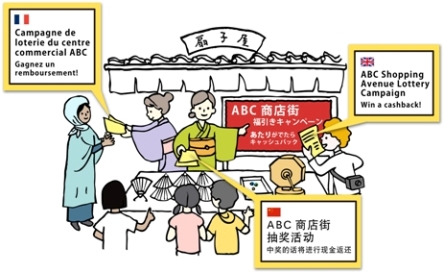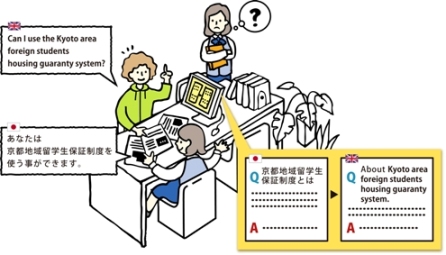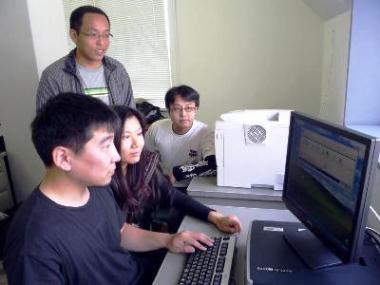Contents
[“A Multilingual Communication Infrastructure in a City” Project Launched -Kyoto on the Language Grid-]
![]()
[Language Grid Toolbox 1.1 Has Been Released]
![]()
[New Language Resources]
![]()
[Monthly Maintenance for December]
![]()
[Language Grid Users] The Kyoto College of Graduate Studies of Informatics and the Kyoto Computer Gakuin
![]()
“A Multilingual Communication Infrastructure in a City” Project Launched -Kyoto on the Language Grid-
"A Multilingual Communication Infrastructure in a City" Project has just been launched!
Kyoto is a tourist city that nine hundred forty thousand foreigners visit every year. The city is also known for having a lot of universities, and the number of long-stay foreign residents including exchange students and researchers is steadily on the rise. Based on the research achievements of the Language Grid, this project aims to utilize the language resources that are shared across the world in solving problems related to the international exchange and multicultural society, which are characteristic of Kyoto.
The specific activities are as follows:

(1) International Exchange in the City
We will establish a multilingual support system for foreign tourists in a shopping mall or temple.
In this activity the Kyoto Information Card System (KICS), which has 1,300 member shops, and the Kodaiji temple will participate. These institutions have been having difficulty in providing information on the shops and temples to foreigners. We will efficiently multilingualize such information with the help of the Language Grid and extend effective support.
In addition, for the easy multilingualization of a large amount of information, we will expand the functions of the Language Grid Toolbox as a translation supporting tool.

(2) Support for Exchange Students
In the universities that are under the "Global 30" Project for Establishing Core Universities Internationalization, such as Kyoto University, we will multilingualize the information necessary for exchange students, and expand the Language Grid Toolbox to develop a tool for multilingual communication using the multilingualized contents.
We will also provide multilingual information on housing and college-related matters for the benefit of exchange students.
In cooperation with House Saison, a rental housing agent, we will create multilingual Q&As on housing, and will expand the Language Grid Toolbox and develop a communication support system for store fronts.
(3) International Exchanges between Children
To support the non-Japanese families living in Kyoto, we will promote the international exchange of information among children by promoting the use of communication technology. In cooperation with NPO Pangaea, we will conduct an activity for multinational children at Kyoto International School. We will also develop facilitators who can support international exchange activities.
Language Grid Toolbox 1.1 Has Been Released
The multilingual collaboration tool, the Language Grid Toolbox, has been upgraded.
Settings of Language Resources at each Translation Hop
In the settings page of the text translation and bulletin board system (BBS), users can specify dictionary services and morphological analyzer services at each hop of a translation path. This function allows the user to select an appropriate dictionary for each hop. In addition, by changing a morphological analyzer, you can select the one that correctly replaces the words in a dictionary with the words in entered texts.
Edit function in the Translation Result Area of the Text Translation
In the Text Translation, it is now possible to edit the translation result area. The edited texts can be checked in the original language by translating them again. The function is useful when you translate texts by modifying the translated texts using machine translation.
Display of the License and Copyright Information of the Services
At the execution of the translation in the Text Translation and BBS, the services that were used for the translation are displayed along with their licenses and copyright information.
Services other than that in the Language Grid can be Used
You can use machine translation and dictionary services that are not registered with the Language Grid for translation on the Toolbox. You can register with the Toolbox by setting up the service type, calling address, and languages.
New Language Resources
New language resources for the educational fields have been added.
Shiga Intercultural Association for Globalization
"Dictionary of Multicultural School Supporting Site: Multilingual Expressions for Schools"
Language Grid Operator
"Miru, Asobu, NIHONGO: Japanese Learning Material for Non-Japanese Students"
Monthly Maintenance for December
The next maintenance of the Language Grid will be conducted on Monday, December 7, 18:00-21:00 JST.
If you wish to use the Language Grid during this period, please contact us in advance at operation [at] langrid.org.
Language Grid Users: The Kyoto College of Graduate Studies of Informatics and the Kyoto Computer Gakuin

-kcg.edu Language Grid International Exchange Support Project-
The Kyoto College of Graduate Studies of Informatics (KCGI) and the Kyoto Computer Gakuin (KCG) have been users of the Language Grid Project since April, 2009.
In the International Exchange Support Project, we conduct activities to develop the site and the tools that promote intercultural communication among the foreign residents in Japan and the middle and high schools that have affiliated schools outside Japan; we have also developed a tool to support the learning of exchange students in KCGI and KCG.
Since the member students of this project have different timetables and study in different campuses, it is difficult to organize face-to-face meetings with everybody present at the same time. To overcome this issue, we use the email and bulletin board systems a lot. The students of Ishida and Matsubara Laboratory at Kyoto University have also joined our development. The three schools collaborate and work together on the design, implementation, and testing phases, by having study sessions on the use of the services, testing the developed translation tools, and discussing the nature of improvements being made. We have several exchange students in the project, and our development team has become a good place for intercultural exchange. The members are striving hard, drawing inspiration from each other, as they try and accomplish the goals of the group.
(Koji Ueda, Associate Professor in the Kyoto College of Graduate Studies of Informatics)
